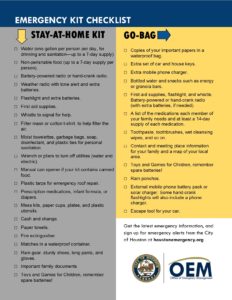The City of Houston is monitoring Hurricane Harvey in the Gulf of Mexico. Houston residents can expect to see a significant amount of rainfall over the next five days, which will likely lead to flooding. It is important that Houston residents stay aware, and begin taking steps in the event Hurricane conditions affect our area in the next few days.
FOR REAL-TIME INFORMATION FROM THE NATIONAL HURRICANE CENTER, VISIT THE LINKS ON THE RIGHT SIDE OF THIS PAGE.
City Updates
[display-posts category="harvey-city"]Partner Updates
[display-posts category="harvey-partners"](8/24/2017 4:53pm)
AlertHouston - Hurricane #Harvey Update #2 (8-24-2017) https://t.co/MMo1nuWrlk #txwx #hounews
— AlertHouston (@AlertHouston) August 24, 2017
(8/24/2017 10:00am)
AlertHouston - Tropical Storm #Harvey Update #2 (8/24/2017) https://t.co/Rzzr0k8iuD #txwx #hounews
— AlertHouston (@AlertHouston) August 24, 2017
(8/23/2017 11:30am)
AlertHouston - Tropical Depression Harvey Forms in the Gulf. Houston Residents Should Prepare https://t.co/8PfKkfiDxf #txwx
— AlertHouston (@AlertHouston) August 23, 2017
The City's Office of Emergency Management will continue to closely monitor this storm and will update Houston residents as soon as information becomes available. Follow OEM on Twitter, Facebook, and Nextdoor for the latest information.
For the latest information on Tropical Systems, visit the National Hurricane Center website at hurricanes.gov.
Steps to Prepare
Houston residents should start taking steps to prepare for the arrival of storm conditions. This includes:
Avoid Roadways
All roadways are vulnerable to dangerous flooding during an intensive rain event. The Department of Public Works & Engineering and the Office of Emergency Management have produced a map of roadway segments and underpasses that are especially prone to flooding - pictured below. If residents are unable to suspend all travel during the duration of this storm, they should heed special caution around these locations. If you see a barricade in your path, DO NOT drive around it or move it. Barricades are put in place explicitly to protect lives.
Have a Plan
Evacuations for this storm system in the City of Houston are unlikely, but may be possible for coastal areas. It's always a good practice to know whether or not you live in an evacuation zone. Most residents in the City of Houston will not be in an evacuation area. (for a map of the zones, click the graphic below)
Some residents who live outside of the evacuation area, but who live in mobile homes, or other structures that cannot withstand the winds associated with a hurricane should consider evacuating.
Additionally, anyone who is medically-dependent on electricity may plan to evacuate, as power may be out for several days.
If you are unable to evacuate yourself, or may need additional assistance due to a medical or other need following the storm, register with the State of Texas Emergency Assistance Registry by calling 2-1-1 or visiting texasstear.org.
EVACUATING
Only those who need to evacuate should.
If you plan to evacuate, you should:
- Identify where you are going and how you are getting there. For a map of official evacuation routes, click here.
- Make sure you have what you need ahead of time. This includes
- Food, Water, Clothes and Medication for 3-5 days
- Carriers for your pets
- Enough cash for 3-5 days.
- Identify a family member or friend who lives out of the Houston area to serve as your family's central point of contact. Write down their phone number and when you arrive at your location, check in with them.
SHELTERING-IN-PLACE
If you place to shelter-in-place, you should:
- Identify where you will shelter in your home. This should be an interior room on the lowest floor possible. If you live in a flood-prone area, you may also want to have a back-up plan to evacuate to a higher floor.
- If you live in a high-rise building, you should consider where you will shelter, interior hallways with no windows are ideal, or seek shelter in a substantial structure elsewhere.
Prepare Your Kit
Regardless of whether or not you decide to evacuate, you should have what you need. The City of Houston recommends having supplies for 5-7 days. Remember, it will take time for stores, ATMs, banks, and other resources to reopen, depending on the level of damage and power outages.
Download a PDF of the City of Houston's Emergency Kit Checklist below:
Prepare Your Home
- Trim tree branches and limbs that might slam against your home or roof
- Secure loose rain gutters and clear clogged areas.
- Prepare to secure windows and doors with durable plywood. For specifics on how to do this, visit the Federal Alliance for Safe Homes website at flash.org
- Purchase a portable generator and prepare it for use. Remember to only use generators at doors at least 20 feet from the home.
Stay Informed
When tropical weather is beginning to form, and during storm impact, its important to remain informed. Ahead of time, stay aware of conditions by following information from the National Hurricane Center and the National Weather Service Houston/Galveston Forecast Office.
The City of Houston uses AlertHouston to communicate with the public during emergencies, including tropical systems. Sign up at houstonemergency.org/alerts for information, and to sign up. You may also follow @AlertHouston on Twitter and Facebook for the latest information.


